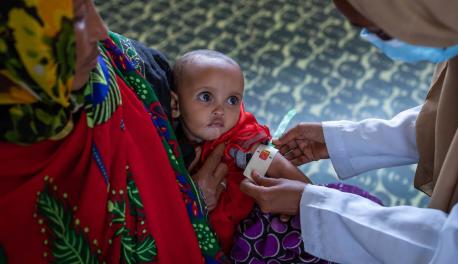
UNICEF Launches $10B Appeal to Help World's Children in 2023
The humanitarian action plan aims to reach over 110 million children impacted by conflict, catastrophe and climate change worldwide.
Addressing the devastating impacts of climate change on vulnerable children and families is the focus of UNICEF's humanitarian action plan for 2023, according to a detailed appeal released today.
An action plan to reach over 110 million children impacted by conflict, catastrophe and climate change
The $10.3 billion plan aims to reach over 110 million children with support and protection across 155 countries and territories. The countries with the greatest funding needs are Afghanistan, the Democratic Republic of the Congo, Ethiopia, Ukraine and Syria.
Gender equality and inclusive programming will remain a top priority for emergency preparedness, response and recovery. Climate action with partners will focus on mitigating climate change risks and investing in climate adaptation through interventions that help build community resilience.
UNICEF will also continue to address global food and nutrition crises, which involves working with partners to support and advance services and best practices for preventing, detecting and treating child malnutrition. UNICEF will also keep working to strengthen delivery of essential health services, including child immunizations.

An appeal for support to address 'a confluence of crises' — from violence to disease outbreaks to malnutrition
In a statement announcing the appeal, UNICEF Executive Director Catherine Russell pointed out that there were more children in need of humanitarian assistance today than at any other time since World War II.
"Across the globe, they are facing a confluence of crises – from violence and displacement to infectious disease outbreaks and soaring rates of malnutrition," Russell said. "Meanwhile, climate change is compounding the severity of these crises and unleashing new ones.
"Just this year, we have seen a wave of deadly climate-linked disasters, including catastrophic floods in Pakistan, historic drought in the Sahel and Horn of Africa, and blistering heat waves across parts of Europe, the Middle East and North America," Rusell added. "And it is children who are bearing the brunt."

Millions of children around the world are struggling to survive, including:
- 400 million children living in areas under conflict
- an estimated 1 billion children — half the world's young population — who are living in places that are extremely vulnerable to the impacts of climate change
- at least 36.5 million children displaced from their homes — the highest number on record
- 8 million children under age 5 across 15 countries suffering from severe wasting, an extreme form of malnutrition that is fatal if left untreated
"Keep in mind that humanitarian emergencies are not bound by national borders," Russell noted. "Conflict and crisis in one part of the world can impact the lives of children thousands of miles away." Malnutrition crises in the Horn of Africa and the central Sahel region, for example, have been linked to the economic fallout and disruption in global markets brought on by the war in Ukraine.

"The situation is not hopeless," Russell continued. UNICEF knows how to reach children who are at greatest risk and have the greatest needs.
From Afghanistan to Somalia, from the Sahel to Yemen, UNICEF is on the ground providing children with lifesaving assistance during humanitarian emergencies; working to strengthen health, protection, water and sanitation, and other systems that children rely on to survive and thrive; and working to make those systems more resilient to climate shocks.
"With support from you – our partners – we have risen to the challenge before," she said. "We can, and we must, do it again."
Help UNICEF support and protect vulnerable children around the world. Your contribution can make a difference. Donate today.

Consider becoming a monthly supporter. In an increasingly volatile world, with more children in need than ever before, access to timely and flexible funding remains critical for UNICEF to respond quickly to crises as they unfold and to anticipate future risks. Flexible funding also helps UNICEF ensure that the humanitarian response is based on need and that resources are allocated equitably. Learn more.
HOW TO HELP
There are many ways to make a difference
War, famine, poverty, natural disasters — threats to the world's children keep coming. But UNICEF won't stop working to keep children healthy and safe.
UNICEF works in over 190 countries and territories — more places than any other children's organization. UNICEF has the world's largest humanitarian warehouse and, when disaster strikes, can get supplies almost anywhere within 72 hours. Constantly innovating, always advocating for a better world for children, UNICEF works to ensure that every child can grow up healthy, educated, protected and respected.
Would you like to help give all children the opportunity to reach their full potential? There are many ways to get involved.



